Business Ethics and Corporate Social Responsibility
VerifiedAdded on 2020/05/08
|7
|1492
|139
AI Summary
This assignment delves into the crucial intersection of business ethics and corporate social responsibility. It examines how ethical considerations influence business practices and explores the motivations behind CSR initiatives. The text analyzes challenges businesses face regarding ethical decision-making, particularly concerning financial resources, employee welfare, and international partnerships. It also touches upon the debate surrounding profitability as a prerequisite for CSR engagement.
Contribute Materials
Your contribution can guide someone’s learning journey. Share your
documents today.
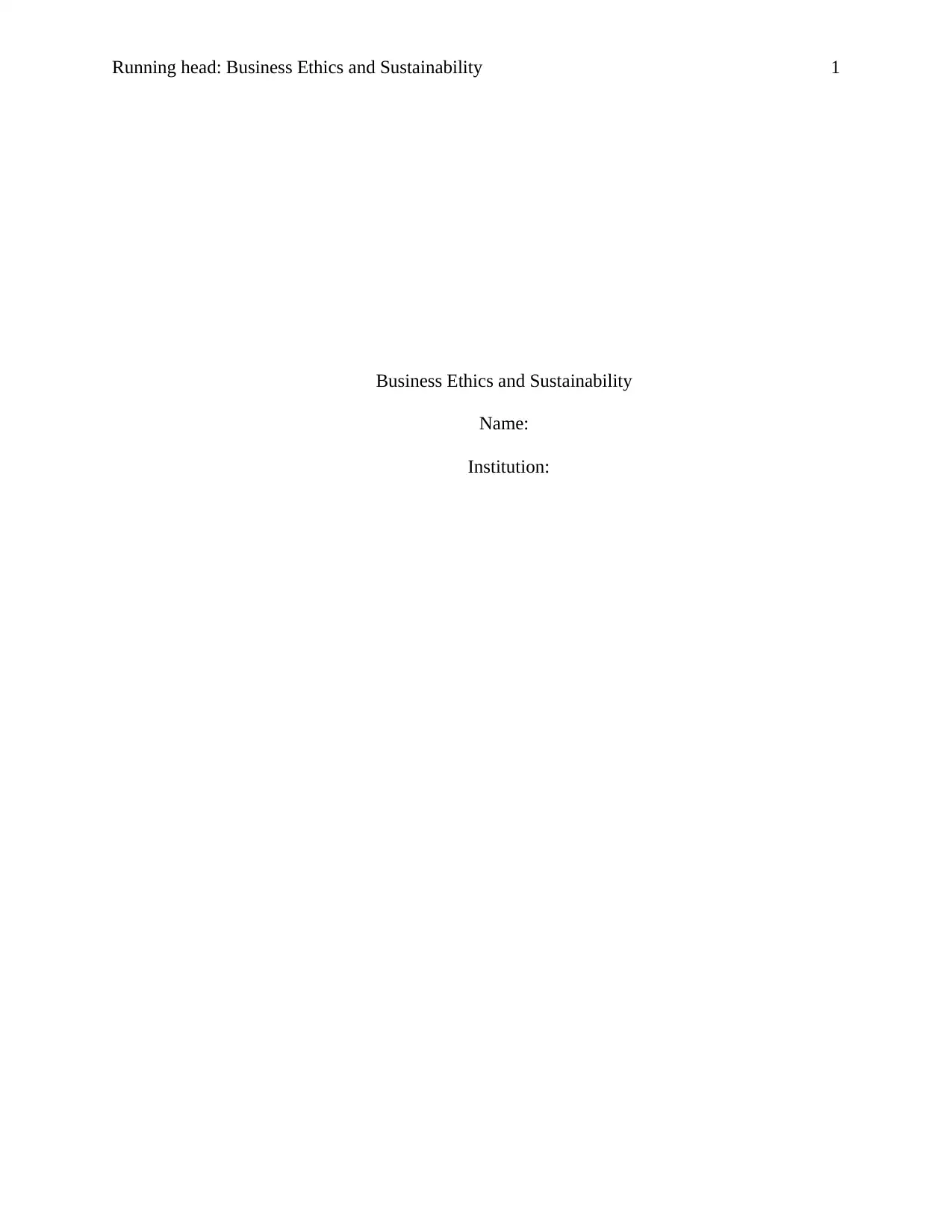
Running head: Business Ethics and Sustainability 1
Business Ethics and Sustainability
Name:
Institution:
Business Ethics and Sustainability
Name:
Institution:
Secure Best Marks with AI Grader
Need help grading? Try our AI Grader for instant feedback on your assignments.
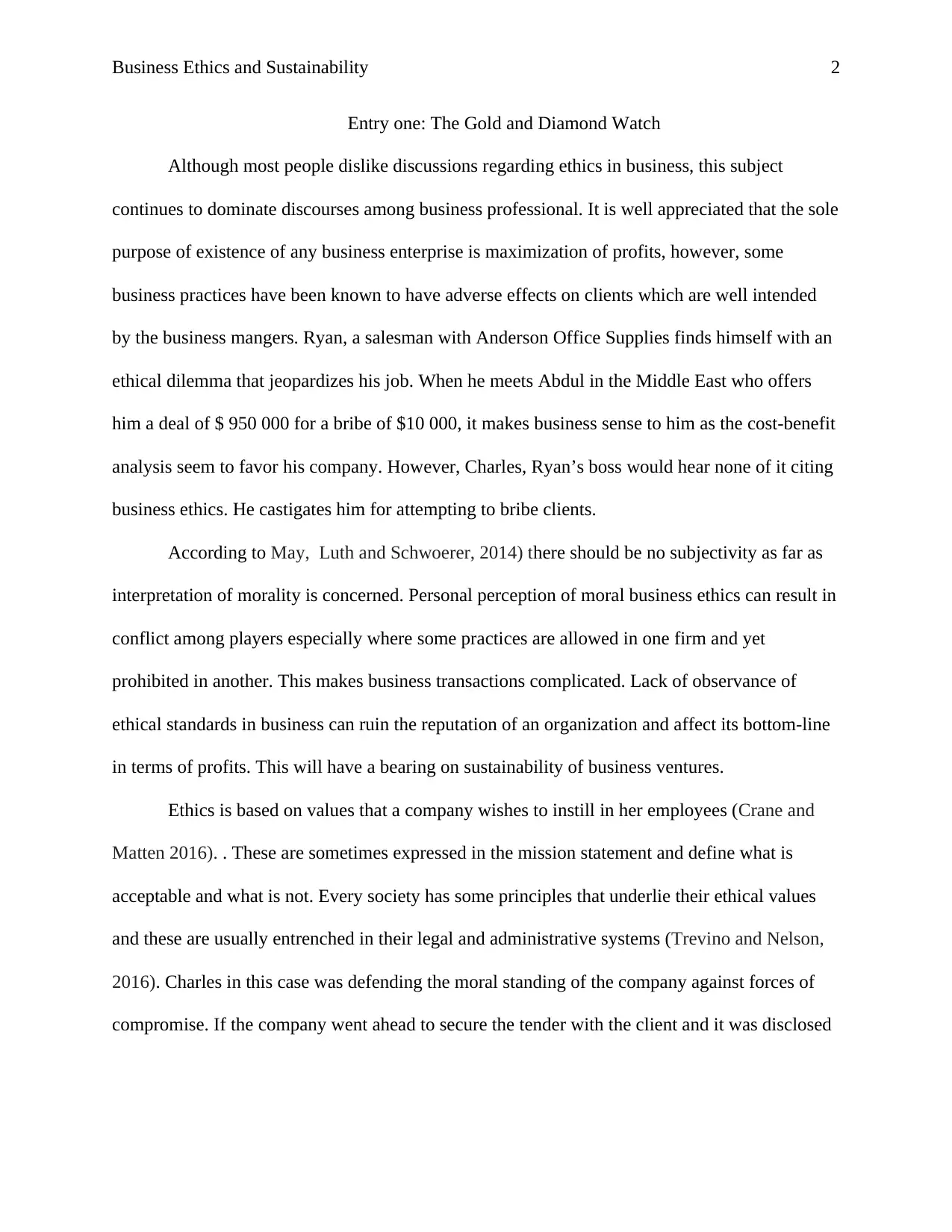
Business Ethics and Sustainability 2
Entry one: The Gold and Diamond Watch
Although most people dislike discussions regarding ethics in business, this subject
continues to dominate discourses among business professional. It is well appreciated that the sole
purpose of existence of any business enterprise is maximization of profits, however, some
business practices have been known to have adverse effects on clients which are well intended
by the business mangers. Ryan, a salesman with Anderson Office Supplies finds himself with an
ethical dilemma that jeopardizes his job. When he meets Abdul in the Middle East who offers
him a deal of $ 950 000 for a bribe of $10 000, it makes business sense to him as the cost-benefit
analysis seem to favor his company. However, Charles, Ryan’s boss would hear none of it citing
business ethics. He castigates him for attempting to bribe clients.
According to May, Luth and Schwoerer, 2014) there should be no subjectivity as far as
interpretation of morality is concerned. Personal perception of moral business ethics can result in
conflict among players especially where some practices are allowed in one firm and yet
prohibited in another. This makes business transactions complicated. Lack of observance of
ethical standards in business can ruin the reputation of an organization and affect its bottom-line
in terms of profits. This will have a bearing on sustainability of business ventures.
Ethics is based on values that a company wishes to instill in her employees (Crane and
Matten 2016). . These are sometimes expressed in the mission statement and define what is
acceptable and what is not. Every society has some principles that underlie their ethical values
and these are usually entrenched in their legal and administrative systems (Trevino and Nelson,
2016). Charles in this case was defending the moral standing of the company against forces of
compromise. If the company went ahead to secure the tender with the client and it was disclosed
Entry one: The Gold and Diamond Watch
Although most people dislike discussions regarding ethics in business, this subject
continues to dominate discourses among business professional. It is well appreciated that the sole
purpose of existence of any business enterprise is maximization of profits, however, some
business practices have been known to have adverse effects on clients which are well intended
by the business mangers. Ryan, a salesman with Anderson Office Supplies finds himself with an
ethical dilemma that jeopardizes his job. When he meets Abdul in the Middle East who offers
him a deal of $ 950 000 for a bribe of $10 000, it makes business sense to him as the cost-benefit
analysis seem to favor his company. However, Charles, Ryan’s boss would hear none of it citing
business ethics. He castigates him for attempting to bribe clients.
According to May, Luth and Schwoerer, 2014) there should be no subjectivity as far as
interpretation of morality is concerned. Personal perception of moral business ethics can result in
conflict among players especially where some practices are allowed in one firm and yet
prohibited in another. This makes business transactions complicated. Lack of observance of
ethical standards in business can ruin the reputation of an organization and affect its bottom-line
in terms of profits. This will have a bearing on sustainability of business ventures.
Ethics is based on values that a company wishes to instill in her employees (Crane and
Matten 2016). . These are sometimes expressed in the mission statement and define what is
acceptable and what is not. Every society has some principles that underlie their ethical values
and these are usually entrenched in their legal and administrative systems (Trevino and Nelson,
2016). Charles in this case was defending the moral standing of the company against forces of
compromise. If the company went ahead to secure the tender with the client and it was disclosed
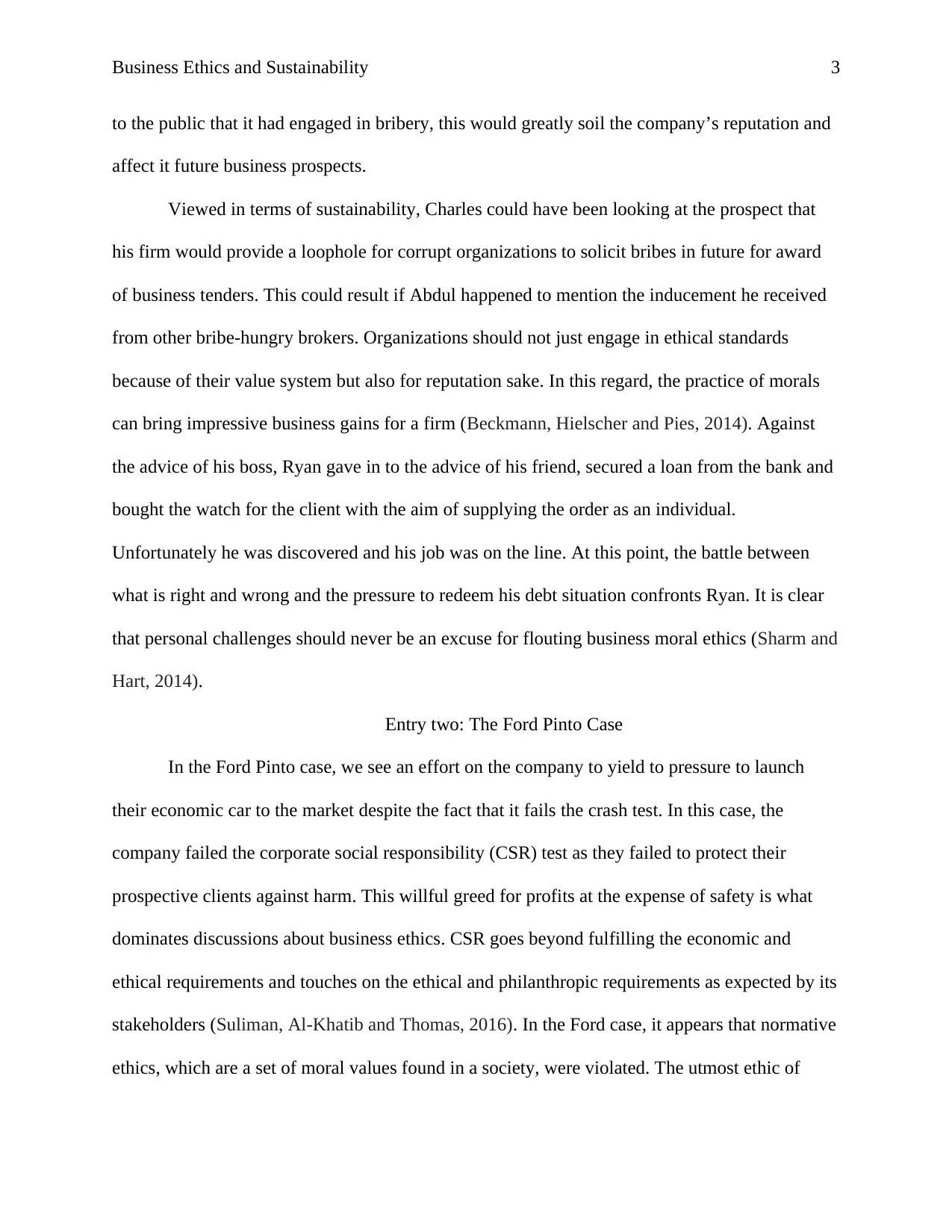
Business Ethics and Sustainability 3
to the public that it had engaged in bribery, this would greatly soil the company’s reputation and
affect it future business prospects.
Viewed in terms of sustainability, Charles could have been looking at the prospect that
his firm would provide a loophole for corrupt organizations to solicit bribes in future for award
of business tenders. This could result if Abdul happened to mention the inducement he received
from other bribe-hungry brokers. Organizations should not just engage in ethical standards
because of their value system but also for reputation sake. In this regard, the practice of morals
can bring impressive business gains for a firm (Beckmann, Hielscher and Pies, 2014). Against
the advice of his boss, Ryan gave in to the advice of his friend, secured a loan from the bank and
bought the watch for the client with the aim of supplying the order as an individual.
Unfortunately he was discovered and his job was on the line. At this point, the battle between
what is right and wrong and the pressure to redeem his debt situation confronts Ryan. It is clear
that personal challenges should never be an excuse for flouting business moral ethics (Sharm and
Hart, 2014).
Entry two: The Ford Pinto Case
In the Ford Pinto case, we see an effort on the company to yield to pressure to launch
their economic car to the market despite the fact that it fails the crash test. In this case, the
company failed the corporate social responsibility (CSR) test as they failed to protect their
prospective clients against harm. This willful greed for profits at the expense of safety is what
dominates discussions about business ethics. CSR goes beyond fulfilling the economic and
ethical requirements and touches on the ethical and philanthropic requirements as expected by its
stakeholders (Suliman, Al-Khatib and Thomas, 2016). In the Ford case, it appears that normative
ethics, which are a set of moral values found in a society, were violated. The utmost ethic of
to the public that it had engaged in bribery, this would greatly soil the company’s reputation and
affect it future business prospects.
Viewed in terms of sustainability, Charles could have been looking at the prospect that
his firm would provide a loophole for corrupt organizations to solicit bribes in future for award
of business tenders. This could result if Abdul happened to mention the inducement he received
from other bribe-hungry brokers. Organizations should not just engage in ethical standards
because of their value system but also for reputation sake. In this regard, the practice of morals
can bring impressive business gains for a firm (Beckmann, Hielscher and Pies, 2014). Against
the advice of his boss, Ryan gave in to the advice of his friend, secured a loan from the bank and
bought the watch for the client with the aim of supplying the order as an individual.
Unfortunately he was discovered and his job was on the line. At this point, the battle between
what is right and wrong and the pressure to redeem his debt situation confronts Ryan. It is clear
that personal challenges should never be an excuse for flouting business moral ethics (Sharm and
Hart, 2014).
Entry two: The Ford Pinto Case
In the Ford Pinto case, we see an effort on the company to yield to pressure to launch
their economic car to the market despite the fact that it fails the crash test. In this case, the
company failed the corporate social responsibility (CSR) test as they failed to protect their
prospective clients against harm. This willful greed for profits at the expense of safety is what
dominates discussions about business ethics. CSR goes beyond fulfilling the economic and
ethical requirements and touches on the ethical and philanthropic requirements as expected by its
stakeholders (Suliman, Al-Khatib and Thomas, 2016). In the Ford case, it appears that normative
ethics, which are a set of moral values found in a society, were violated. The utmost ethic of
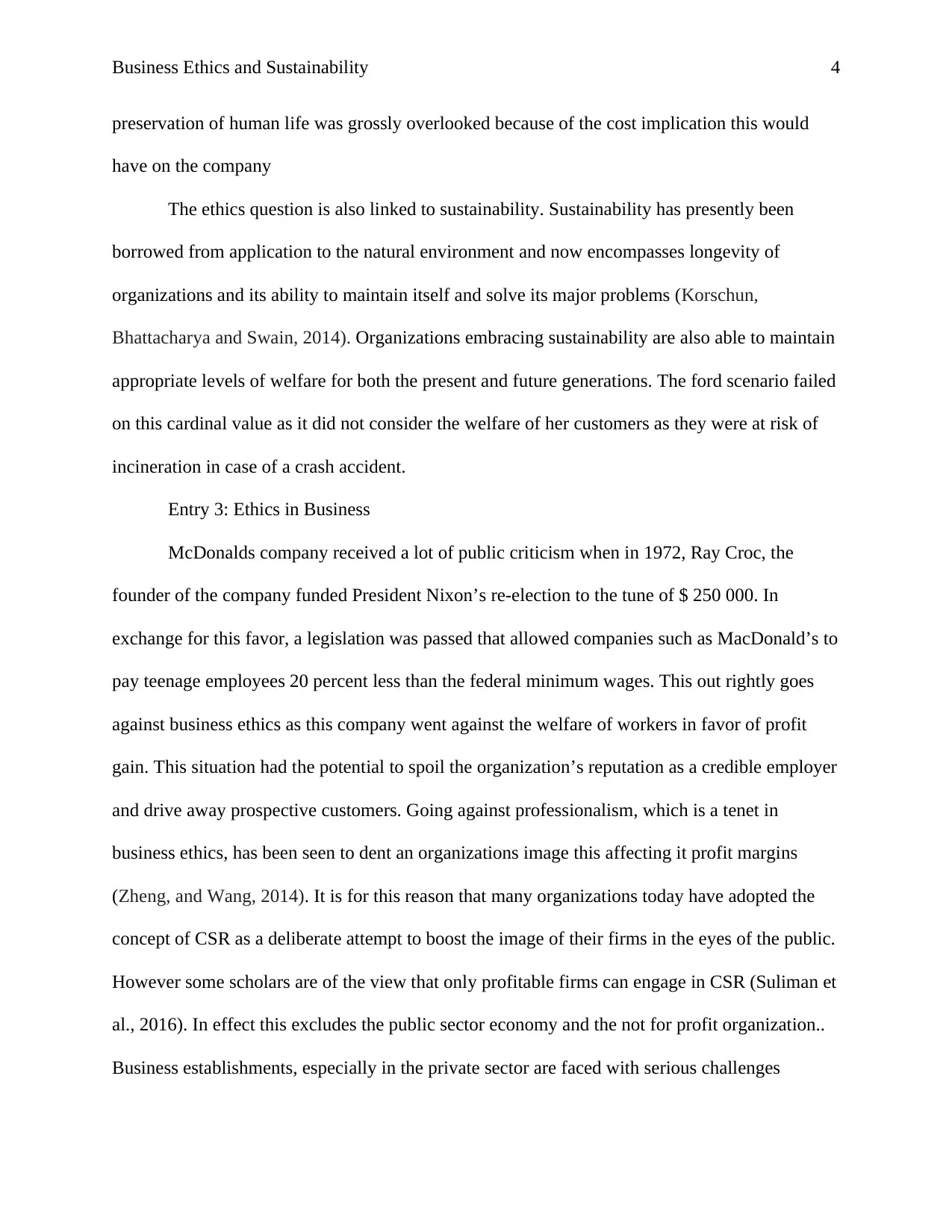
Business Ethics and Sustainability 4
preservation of human life was grossly overlooked because of the cost implication this would
have on the company
The ethics question is also linked to sustainability. Sustainability has presently been
borrowed from application to the natural environment and now encompasses longevity of
organizations and its ability to maintain itself and solve its major problems (Korschun,
Bhattacharya and Swain, 2014). Organizations embracing sustainability are also able to maintain
appropriate levels of welfare for both the present and future generations. The ford scenario failed
on this cardinal value as it did not consider the welfare of her customers as they were at risk of
incineration in case of a crash accident.
Entry 3: Ethics in Business
McDonalds company received a lot of public criticism when in 1972, Ray Croc, the
founder of the company funded President Nixon’s re-election to the tune of $ 250 000. In
exchange for this favor, a legislation was passed that allowed companies such as MacDonald’s to
pay teenage employees 20 percent less than the federal minimum wages. This out rightly goes
against business ethics as this company went against the welfare of workers in favor of profit
gain. This situation had the potential to spoil the organization’s reputation as a credible employer
and drive away prospective customers. Going against professionalism, which is a tenet in
business ethics, has been seen to dent an organizations image this affecting it profit margins
(Zheng, and Wang, 2014). It is for this reason that many organizations today have adopted the
concept of CSR as a deliberate attempt to boost the image of their firms in the eyes of the public.
However some scholars are of the view that only profitable firms can engage in CSR (Suliman et
al., 2016). In effect this excludes the public sector economy and the not for profit organization..
Business establishments, especially in the private sector are faced with serious challenges
preservation of human life was grossly overlooked because of the cost implication this would
have on the company
The ethics question is also linked to sustainability. Sustainability has presently been
borrowed from application to the natural environment and now encompasses longevity of
organizations and its ability to maintain itself and solve its major problems (Korschun,
Bhattacharya and Swain, 2014). Organizations embracing sustainability are also able to maintain
appropriate levels of welfare for both the present and future generations. The ford scenario failed
on this cardinal value as it did not consider the welfare of her customers as they were at risk of
incineration in case of a crash accident.
Entry 3: Ethics in Business
McDonalds company received a lot of public criticism when in 1972, Ray Croc, the
founder of the company funded President Nixon’s re-election to the tune of $ 250 000. In
exchange for this favor, a legislation was passed that allowed companies such as MacDonald’s to
pay teenage employees 20 percent less than the federal minimum wages. This out rightly goes
against business ethics as this company went against the welfare of workers in favor of profit
gain. This situation had the potential to spoil the organization’s reputation as a credible employer
and drive away prospective customers. Going against professionalism, which is a tenet in
business ethics, has been seen to dent an organizations image this affecting it profit margins
(Zheng, and Wang, 2014). It is for this reason that many organizations today have adopted the
concept of CSR as a deliberate attempt to boost the image of their firms in the eyes of the public.
However some scholars are of the view that only profitable firms can engage in CSR (Suliman et
al., 2016). In effect this excludes the public sector economy and the not for profit organization..
Business establishments, especially in the private sector are faced with serious challenges
Secure Best Marks with AI Grader
Need help grading? Try our AI Grader for instant feedback on your assignments.
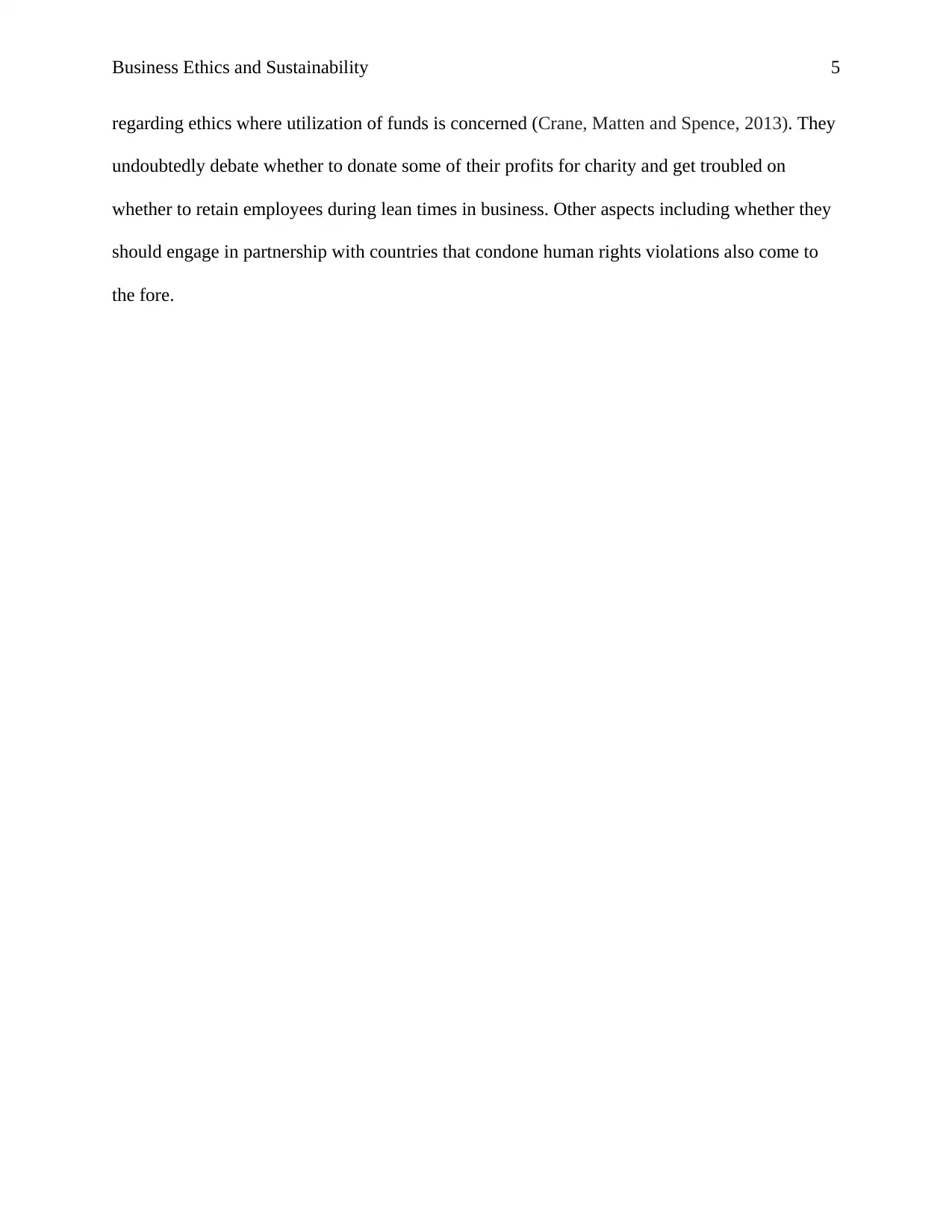
Business Ethics and Sustainability 5
regarding ethics where utilization of funds is concerned (Crane, Matten and Spence, 2013). They
undoubtedly debate whether to donate some of their profits for charity and get troubled on
whether to retain employees during lean times in business. Other aspects including whether they
should engage in partnership with countries that condone human rights violations also come to
the fore.
regarding ethics where utilization of funds is concerned (Crane, Matten and Spence, 2013). They
undoubtedly debate whether to donate some of their profits for charity and get troubled on
whether to retain employees during lean times in business. Other aspects including whether they
should engage in partnership with countries that condone human rights violations also come to
the fore.
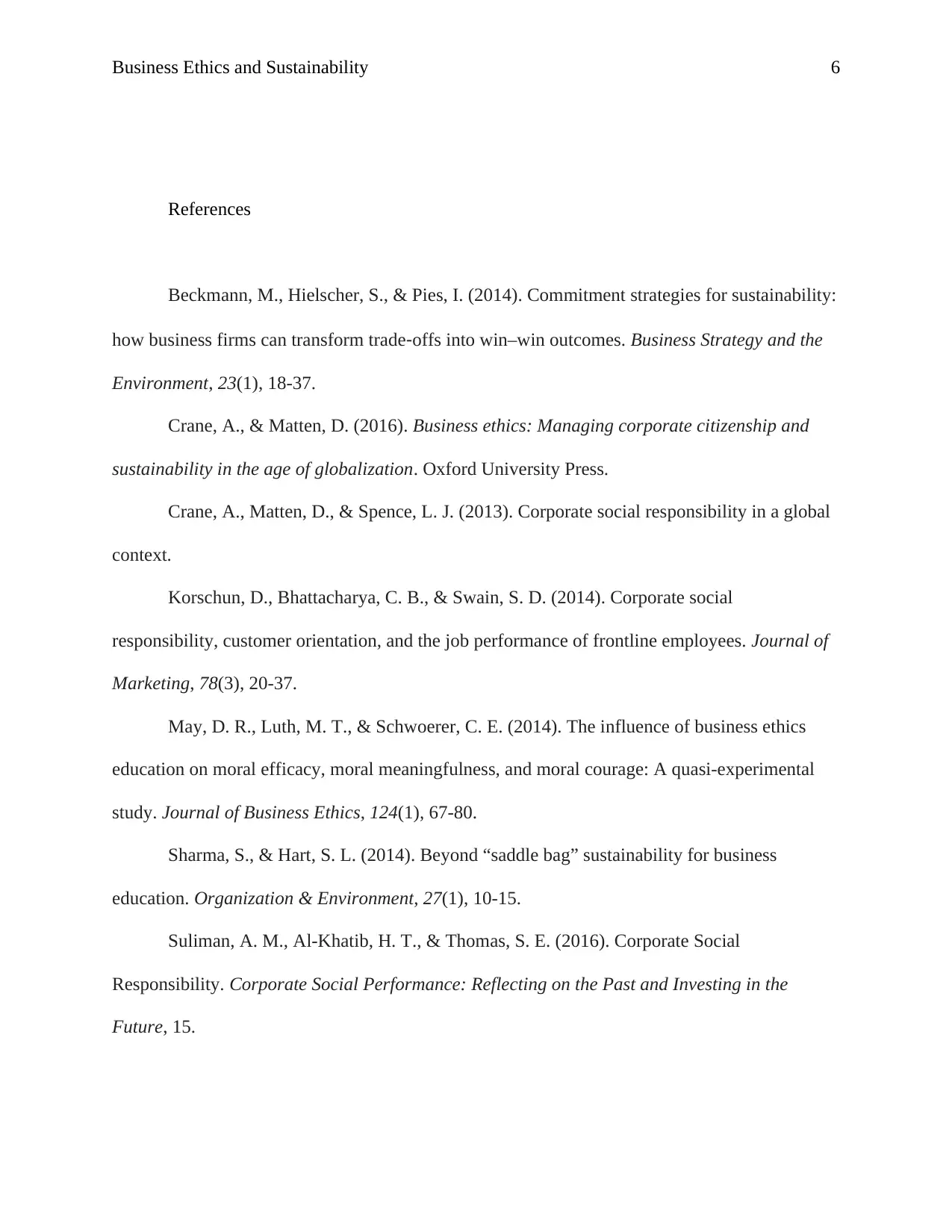
Business Ethics and Sustainability 6
References
Beckmann, M., Hielscher, S., & Pies, I. (2014). Commitment strategies for sustainability:
how business firms can transform trade‐offs into win–win outcomes. Business Strategy and the
Environment, 23(1), 18-37.
Crane, A., & Matten, D. (2016). Business ethics: Managing corporate citizenship and
sustainability in the age of globalization. Oxford University Press.
Crane, A., Matten, D., & Spence, L. J. (2013). Corporate social responsibility in a global
context.
Korschun, D., Bhattacharya, C. B., & Swain, S. D. (2014). Corporate social
responsibility, customer orientation, and the job performance of frontline employees. Journal of
Marketing, 78(3), 20-37.
May, D. R., Luth, M. T., & Schwoerer, C. E. (2014). The influence of business ethics
education on moral efficacy, moral meaningfulness, and moral courage: A quasi-experimental
study. Journal of Business Ethics, 124(1), 67-80.
Sharma, S., & Hart, S. L. (2014). Beyond “saddle bag” sustainability for business
education. Organization & Environment, 27(1), 10-15.
Suliman, A. M., Al-Khatib, H. T., & Thomas, S. E. (2016). Corporate Social
Responsibility. Corporate Social Performance: Reflecting on the Past and Investing in the
Future, 15.
References
Beckmann, M., Hielscher, S., & Pies, I. (2014). Commitment strategies for sustainability:
how business firms can transform trade‐offs into win–win outcomes. Business Strategy and the
Environment, 23(1), 18-37.
Crane, A., & Matten, D. (2016). Business ethics: Managing corporate citizenship and
sustainability in the age of globalization. Oxford University Press.
Crane, A., Matten, D., & Spence, L. J. (2013). Corporate social responsibility in a global
context.
Korschun, D., Bhattacharya, C. B., & Swain, S. D. (2014). Corporate social
responsibility, customer orientation, and the job performance of frontline employees. Journal of
Marketing, 78(3), 20-37.
May, D. R., Luth, M. T., & Schwoerer, C. E. (2014). The influence of business ethics
education on moral efficacy, moral meaningfulness, and moral courage: A quasi-experimental
study. Journal of Business Ethics, 124(1), 67-80.
Sharma, S., & Hart, S. L. (2014). Beyond “saddle bag” sustainability for business
education. Organization & Environment, 27(1), 10-15.
Suliman, A. M., Al-Khatib, H. T., & Thomas, S. E. (2016). Corporate Social
Responsibility. Corporate Social Performance: Reflecting on the Past and Investing in the
Future, 15.
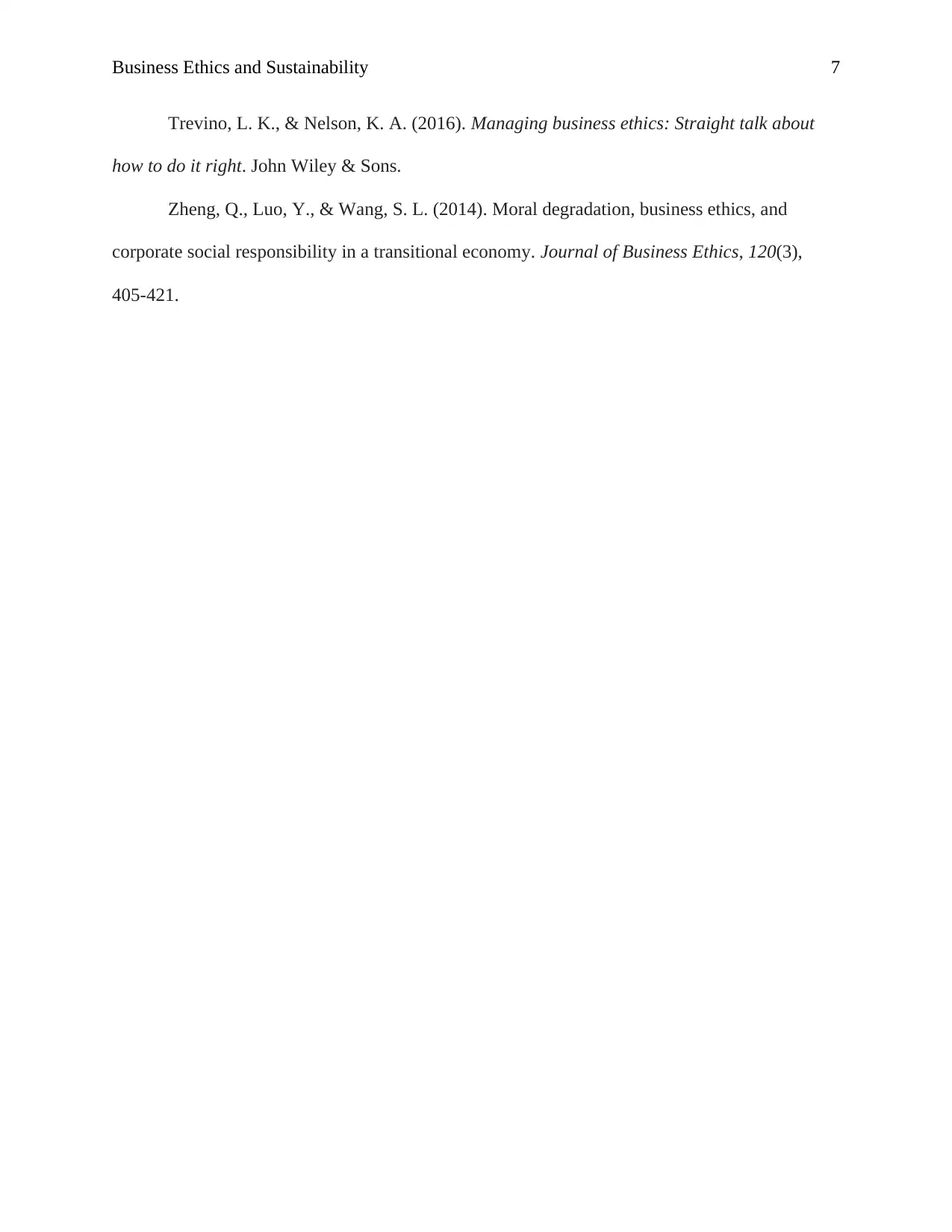
Business Ethics and Sustainability 7
Trevino, L. K., & Nelson, K. A. (2016). Managing business ethics: Straight talk about
how to do it right. John Wiley & Sons.
Zheng, Q., Luo, Y., & Wang, S. L. (2014). Moral degradation, business ethics, and
corporate social responsibility in a transitional economy. Journal of Business Ethics, 120(3),
405-421.
Trevino, L. K., & Nelson, K. A. (2016). Managing business ethics: Straight talk about
how to do it right. John Wiley & Sons.
Zheng, Q., Luo, Y., & Wang, S. L. (2014). Moral degradation, business ethics, and
corporate social responsibility in a transitional economy. Journal of Business Ethics, 120(3),
405-421.
1 out of 7
Related Documents
Your All-in-One AI-Powered Toolkit for Academic Success.
+13062052269
info@desklib.com
Available 24*7 on WhatsApp / Email
![[object Object]](/_next/static/media/star-bottom.7253800d.svg)
Unlock your academic potential
© 2024 | Zucol Services PVT LTD | All rights reserved.




